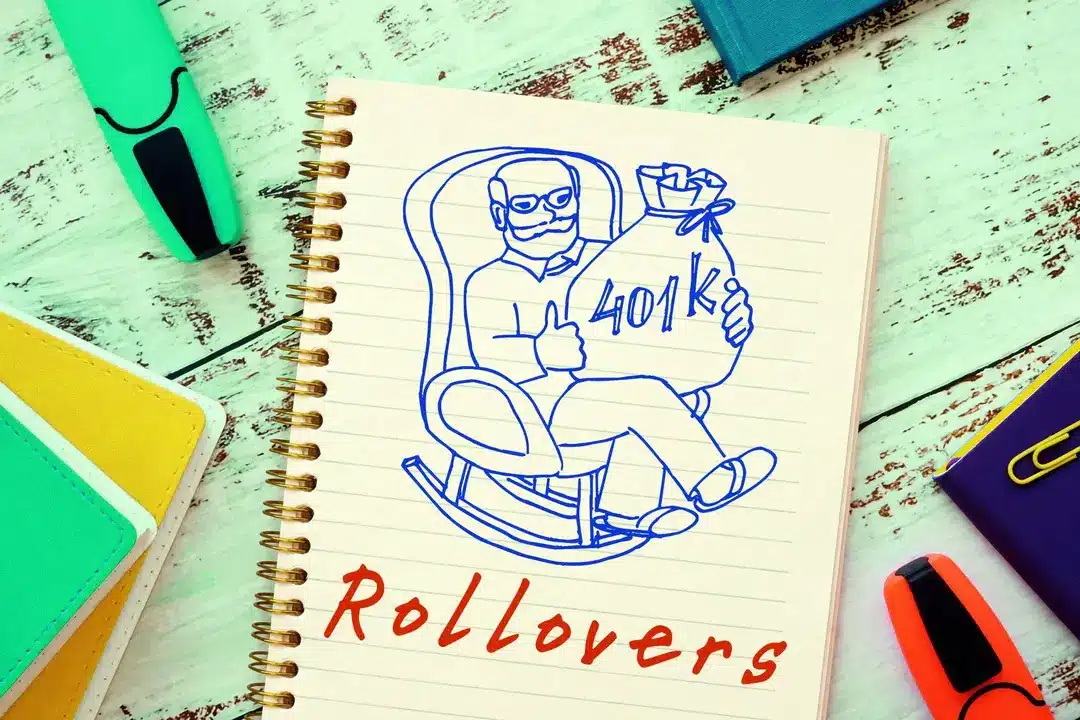Most savers are contributing pre-tax dollars to their traditional IRA. A Roth IRA lets you contribute post-tax dollars. A person who leaves their job can roll their employer-sponsored 401(k) into a rollover IRA without paying taxes on the funds.
Why Do You Have to Roll Over Your 401(k) After You Quit or Get Laid Off?
You don’t – at least not always. Whether you will be forced take any action with your 401(k) after losing a job or finding a new job depends entirely on the employer or management company’s rules and the size of your 401(k).
If your 401(k) is under $5,000 you may be forced to move that money into an IRA. However, the company is legally required to help you set up a rollover IRA if you have between $1,000 and $5,000 in the account. If you have less than $1,000 in your 401(k) the company may just send you a check.
Rolling over any disbursements you receive into a retirement account is the only way to avoid having the money taxed as income, plus being forced to pay the 10 percent early withdrawal penalty the IRS will levy on the money.
If you have more than $5,000 in your 401(k) when you leave your job you will likely be able to leave the money there indefinitely. However, there are some potential drawbacks for parking a 401(k) with an old employer:
- If you have a lot of jobs over the course of your working life you could have a handful of little 401(k)s floating around, which isn’t ideal for transparent and precise management of your retirement assets
- In many cases people who have several 401(k)s from past employers aren’t staying actively involved in the management or allocations of those funds (especially since each is probably accessed through a unique online dashboard)
- If you were ever in a situation where you needed a 401(k) loan you likely couldn’t use a 401(k) from a pervious employer
Can You Rollover a 401(k) from an Old Job into Your New Employer’s 401(k)?
Yes – many companies do allow you to rollover an old 401(k) into your new plan. This is what’s known as a “direct rollover.” Direct rollovers do not count as disbursements so you will not suffer any penalties or taxes.
I Have the Option for a 401(k) Rollover at My New Job – Should I Do that or a Rollover IRA?
This is a really personal question that you should probably discuss with a financial advisor, but there are some important features of both 401(k)s and IRAs that make them appropriate for different types of retirement savers.
If you’re interested in diversifying your portfolio, putting your retirement savings into specific stocks or ETFs, or you’d like to invest in precious metals or cryptocurrency, a rollover IRA might be the better option.
Most 401(k) plans have a limited number of investment options geared towards the saver’s risk preferences. In most cases you can choose to spread your 401(k) money over a dozen or so mutual funds that often fall into one of the following categories:
- Conservative (Lowest Risk)
- Value (Medium Risk)
- Balanced (Medium-High Risk)
- Aggressive Growth (High Risk)
- Specialty Funds (Often in specific sectors like utilities or foreign investment funds)
- Target-Date Funds (Modifies the types of funds your money is in to maximize the value of your 401(k) at your projected retirement date)
Rolling a 401(k) into a self-directed IRA, either a Roth IRA or a traditional IRA, essentially allows you to invest the money however you want. As long as you follow the rules pertaining to withdrawals and stay within contribution limits, you’re free to buy and sell equities, bonds, ETFs and even real estate or precious metals.
Can I Rollover My 401(k) into an IRA While I’m at the Same Job?
In some cases, yes – it really depends on the employer and their retirement savings management provider. Whether that’s a good idea often depends on how actively you want to manager your retirement savings.
If you’re just a passive investor and you’re content with your 401(k) provider’s allocation options then you likely won’t want to start a rollover IRA while you’re still employed by the same company.
However, if you think your employer’s 401(k) management company has lackluster performance or a lack of investment diversification, a rollover IRA might be right for you.
You should always speak with a financial advisor before making any big decisions about your retirement savings. The team at Fullerton Financial Planners would be happy to advise, schedule a meeting today.






